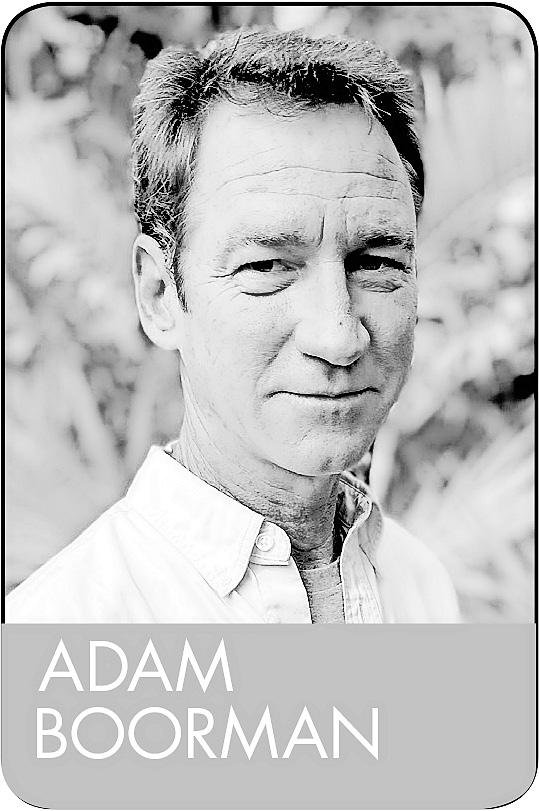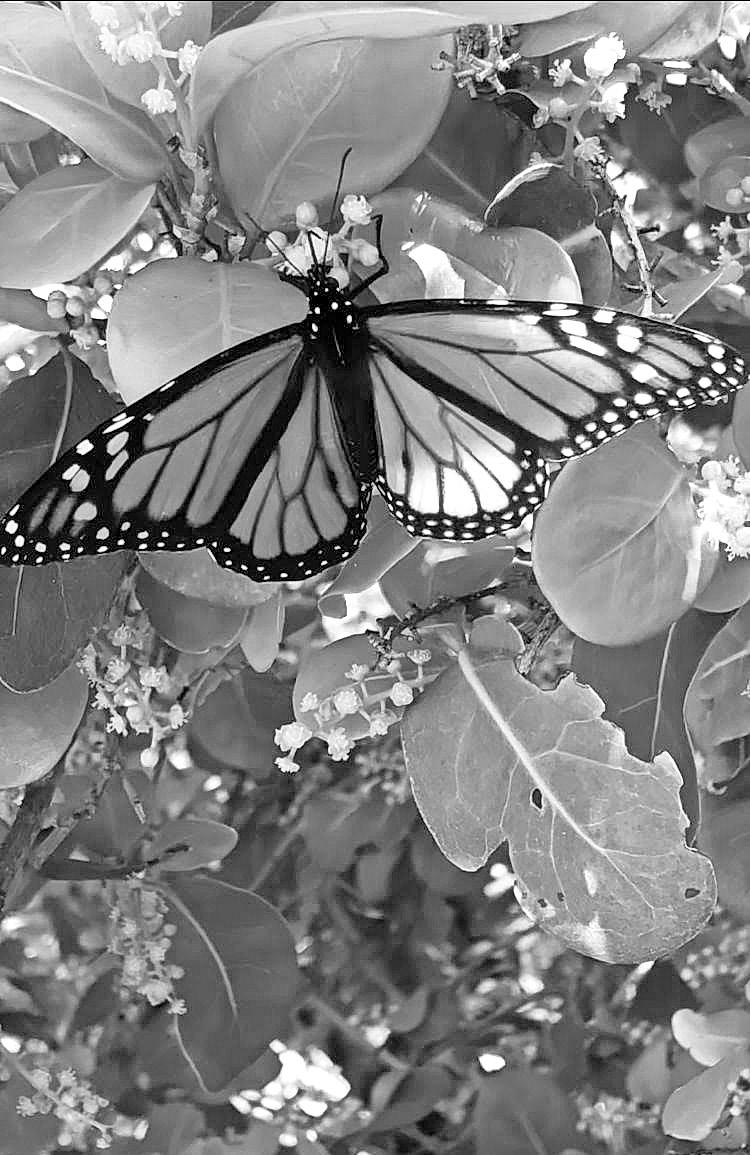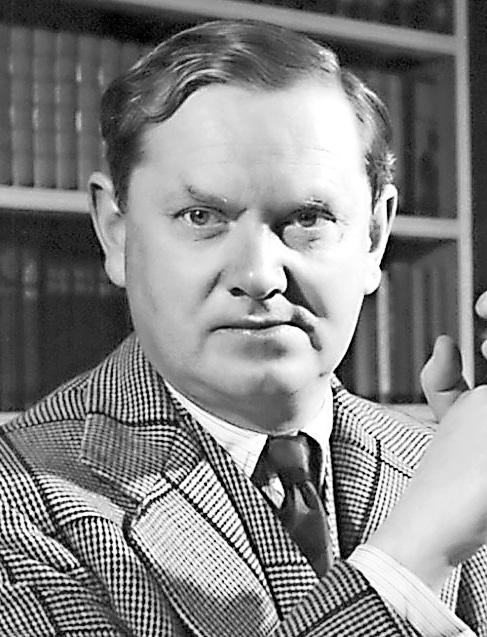
8 minute read
Gardening
from 10292021 WEEKEND
by tribune242
The importance of natives
Isaw one of the most spectacular sights last week in Exuma. I was visiting a gorgeous property and if you know the islands, you’ll know that there are still enough native plants and trees to satisfy all our native and migratory bird and insect species (and yes, we need insects, they are part of the food circle just like anything else!), much unlike New Providence where the bulldozer has destroyed most of our native flora to the detriment of us all. In this instance, there was a pigeon plum tree that was in full flower, and it was absolutely covered in bees, butterflies, and insects. What struck me other than the fact that the tree was supporting hundreds if not thousands of living organisms, was that it was host to dozens or more monarch butterflies.
Advertisement
I have never seen a monarch butterfly in the Bahamas and I was awestruck, it was magnificent to see. Now, I’ve seen the monarch in Canada, and according to studies that I have glanced, our island chain seems to be on the outer edge of their seasonal flight path as they migrate south. I felt lucky indeed to witness such a beautiful and threatened species stopping in and refueling on our islands while on their way to their overwintering grounds in the Oyamel Fir forests in Mexico. For a naturalist and native tree and plant lover, it was a treat. It brought to mind the importance of native species in supporting life. Please read the preceding sentence again.
Far too often we tend to landscape with exotic species, mostly originating in Asia or the Indo-Pacific regions, that support nothing more than common garden pests rather than native or migratory species. Maybe one day we will wake up and legislate a law that criminalises the clear cutting of land and the destruction of native trees and plants, in the name of development. We can create a better world for ourselves and for generations to come if we were to mandate that at least one native tree be left to grow on the average sized residential lot, and that major development be mandated to leave a given number per acre, et al. Clearing a piece of land and planting exotic species does us no favors. Please, stop knocking down all our native trees! We are but guardians and stewards of this only home that we have, after all. When will the destruction be controlled in a sustainable manner? Not only do native trees and shrubs support life (got oxygen?), but they also cool us and calm us down. It seems that the unsubstantiated and irrational fear of trees near a home or building is the common theme, once again, to the detriment of life. Trees are calming and help to ease stress. Being in nature is therapeutic and helps restore health and well-being.
With all the violence that this world creates (turn off the TV and go sit in the trees), surely we can reign in the destruction of our native species and start giving back to future generations by leaving alone a portion of what has been given to us, that which supports life and gives us the essential gas that we breathe and sequesters the carbon that we create. Each one of us can plant a native shrub or tree, or at the very least, stop destroying them. Trees make our world a better place. So do vegetables and edible plants. Have you prepped your pots or garden beds for vegetables and leafy greens yet? Now is the time. Most anything that we can grow for food can be planted now. Consult with your favorite plant nursery or garden center for the correct potting or planting medias to use for specific crops or situations if you are unsure. Seeds will sprout quickly at this time of year and transplanting already started plants will give you a jump start. The list is too long as to what will grow now. If you can think of it, it will grow now. Veggies and greens thrive between October and May in our region. Go on out the door and get in the garden, it’s good for you. Are you composting yet? As always, I wish you happy gardening.

THE MONARCH butterfly
• Adam Boorman is the nursery manager at the Fox Hill Nursery. You can contact him with any questions you may have, or topics you would like to see discussed, at gardening242@gmail.com. at gardening242@gmail.com.
‘Nastiest tempered man in England’ who wrote the most elegant prose Part II
Sir Christopher Ondaatje continues his biography of Evelyn Waugh - one of the great prose stylists of the English language in the 20th century.
“I’ve always been bad. Probably I shall be bad again, punished again. But the worse I am, the more I need God. I can’t shut myself out from His mercy ... Or it may be a private bargain between me and God, and that if I give up this one thing I want so much, however bad I am, He won’t quite despair of me in the end.”
- Evelyn Waugh
Evelyn Waugh and Laura Herbert, his second wife, lived in Piers Court, Gloucestershire, after their marriage on April 17 1937. Their first daughter, Maria Teresa, was born on March 9, 1938, and their son, Auberon Alexander, on November 17, 1939. Between these dates, Scoop was published in May 1938 to great critical acclaim. In August that year he took Laura for a three-month trip to Mexico, following which he published Robbery Under Law about his experiences there.
Waugh left Piers Court on September 1, 1939, at the outbreak of the Second World War and moved his family to Pixton Park in Somerset while he looked for employment in the British Army. He was commissioned in the Royal Marines and started training at the Chatham naval base. He did not adapt to the severe training routine and complained that he had so stiff a spine that he could not even pick up a pen. He was promoted to Captain and given command of a Company but was, as he always was, haughty and blunt with his men. His command was taken away from him and he was made an “Intelligence Officer” and sent to West Africa in August 1940 to support the Free French Forces overthrow the Vichy French colonial government and install General Charles de Galle in its place. Operation Menace, as the action was called, failed miserably and the British forces withdrew. Waugh stated that “bloodshed has been avoided at the cost of honour”. Then, in November 1940, Waugh became a member of “Layforce” under Colonel Robert Laycock and sailed to the Mediterranean where it was involved in an unsuccessful attempt to recapture Bardia on the Libyan coast. It was another disaster, and was followed the following May in the evacuation of Crete. Waugh reported that he was shocked at the disorder and cowardice of the departing troops. It was another failed experience and when he returned to Britain Colonel Laycock recommended that Waugh be transferred to the Royal Horse Guards. However, this transfer too failed to find opportunities for active service. His unmilitary and insubordinate character rendered him unemployable as a soldier. He began parachute training in Tatton Park, Cheshire, but landed awkwardly and fractured a fibula. While recovering at Windsor, he applied for unpaid leave which was understandably granted and he retired to Chagford in Devon where he could work in seclusion at what he knew best. The result was Brideshead Revisited: The Sacred and Profane Memories of Captain Charles Ryder (1945) – the immensely successful tragicomedy set in the period of the First and Second World Wars. It is the most nostalgic and reflective of Evelyn Waugh’s novels and looks back on the golden age before the Second World War, and of Charles Ryder’s infatuation with the Catholic Marchmains and the rapidly disappearing world of privilege they inhabit in a palatial mansion called Brideshead Castle.
After Waugh returned to duty in 1944, flushed with success, he was recruited by Randolph Churchill, another well-known tippler, to serve with him in the Maclean Mission to Yugoslavia. They flew together from Bari in Italy to the Croatian island of Yis where they met Marshal Tito, the communist leader of the Partisans leading the guerrilla fight against the occupying Axis forces with Allied support. Waugh and Churchill returned to Bari before flying back to Yugoslavia to begin their mission but, plagued with either disaster or bad luck, their aeroplane crashlanded. Both men were injured and their mission was delayed. Churchill’s mission was eventually established in a deserted farmhouse where liaison duties between the British Army and the communist partisans were light. Waugh despised Tito, and was much more concerned with the welfare of the Catholic Church in Croatia. He returned home on March 15, 1945 and presented a report “Church and State in liberated Croatia”. This report was understandably suppressed as the Foreign Office wanted to maintain good relations with Tito.
Evelyn Waugh’s army career was a litany of disasters, however, he was delighted with the 1945 reception of Brideshead Revisited which brought him fame, fortune and literary esteem. He looked back on his experiences in the War as “a sweaty tug-of-war between teams of indistinguishable louts”. He saw the defeat of Winston Churchill in the 1945 general election and the victory of the Labour Party as a “triumph of barbarism”.
The army released Waugh in September 1945 and he returned to Piers Court with his family and another daughter who was born in 1944. However, he spent the next seven years travelling or in London. He visited the Nuremberg Trials in 1947, and the next year went to the United States discussing the filming of Brideshead Revisited. His efforts failed but he visited the Forest Lawn Cemetery and scrounged material for The Loved One – a satirical treatise on American perspectives on death. He went to the Holy Land and to Goa with his future biographer Christopher Sykes, and worked intermittently on Helena – a novel about the discoverer of the True Cross which he claimed was by far his best book. It wasn’t – but, as his daughter Harriet said, “It was the only one of his books that he ever cared to read aloud.”










